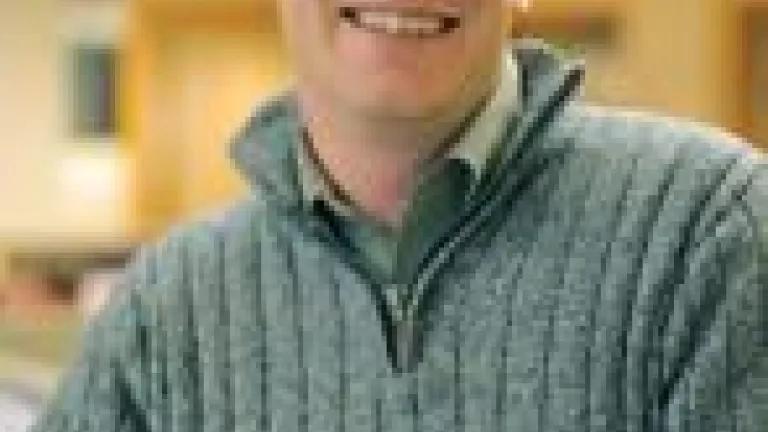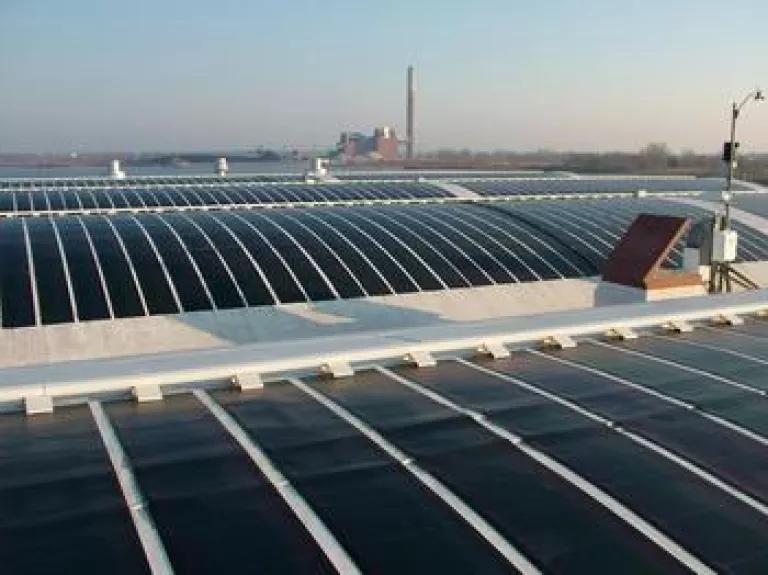
Last week a study came out listing the top ten states in clean energy "leadership" and at first glance it was mostly what you might think: California, Oregon, Massachusetts, New York, Colorado. But I was surprised to see Michigan listed as the leading state in clean energy patents. That led me to wonder, what's going on in Michigan? And that question led me to Dan Kuipers. Dan has no patents to his name as far as I know, but he's is not your average Michigan college student either. To begin with, when he graduated from Grand Valley State University in Allendale earlier this month, he was 35, with three kids, not 22 years-old and fancy-free.
Here’s another thing that makes Dan Kuipers different: He’s got a good job in his home state, near the Great Lake that he loves. That’s no small feat. Among Kuipers’ classmates, a sizable number are still unemployed. (One-eighth of GVSU’s 2010 graduating class, for instance, has yet to find work.)
Kuipers’ employment has been made possible by renewable energy and the government policies that promote it. You see, Dan is the co-founder of Sustainable Energy Financing, a Holland, Michigan-based firm. “Our company mandate is to identify and acquire financing and the financial incentives that can make renewable energy projects and energy-efficiency projects pencil out,” he explains.
In Michigan, much of SEF’s work has been with farmers and greenhouse growers. SEF hooks them up with the financing necessary to install solar arrays and other clean energy systems that power and heat their resource-intensive greenhouses. “The vast majority of their operating costs come from the natural gas and propane used for heat,” Kuipers explains. “With solar,” he says, growers aren’t just decreasing their operating costs. “They’re becoming farmers of energy.”
Kuipers’ company works outside of Michigan, too, on financing for wind farms and other renewable energy projects. Often these projects are driven by state-mandated renewable energy portfolio standards (RPS), which require that a certain percentage of a state’s electricity comes from clean-energy sources. “The RPS and how its utilized,” says Kuipers, “is key to our business.”
A business that is growing, by the way. Since last fall, SEF’s US operation has grown from three employees to five; in Africa, where the group helps bring electricity to those who have none, SEF employs four. “In the next two or three years, we hope to have a staff of 10-15 working in the US,” Kuipers says. “And when we grow up, we want to be renewable-energy project developers,” not just securing financing and incentives, but developing wind, solar and other clean-energy projects from beginning to end. “We’re going to become the orchestra leader and develop our own projects based on sound environmental and business ideas.”
Government clean-energy incentives are paving the way for SEF’s growth, allowing Dan Kuipers and his employees to find good work in their beloved home state. But these policies have done much more, assisting businesses across Michigan in their efforts to retain and create jobs in an otherwise difficult economy.

(Below is a picture of a SEF project on the roof of the Michigan Alternative Renewable Energy Center and in the background you can see the lake and a power plant lest you forget where you are or what solar is displacing.)
Consider the case of one greenhouse grower Dan Kuipers has helped. The skyrocketing costs of propane and heating oil were threatening the grower’s firm’s viability. He told Kuipers, “We need to put in this renewable energy system or we won’t be in business 12 months from now. I need to be in control of my own energy future.” Luckily, forward-looking government clean-energy policies were there to help. And so was Dan Kuipers, whose own work helps retain and rebuild Michigan’s economic strength.

